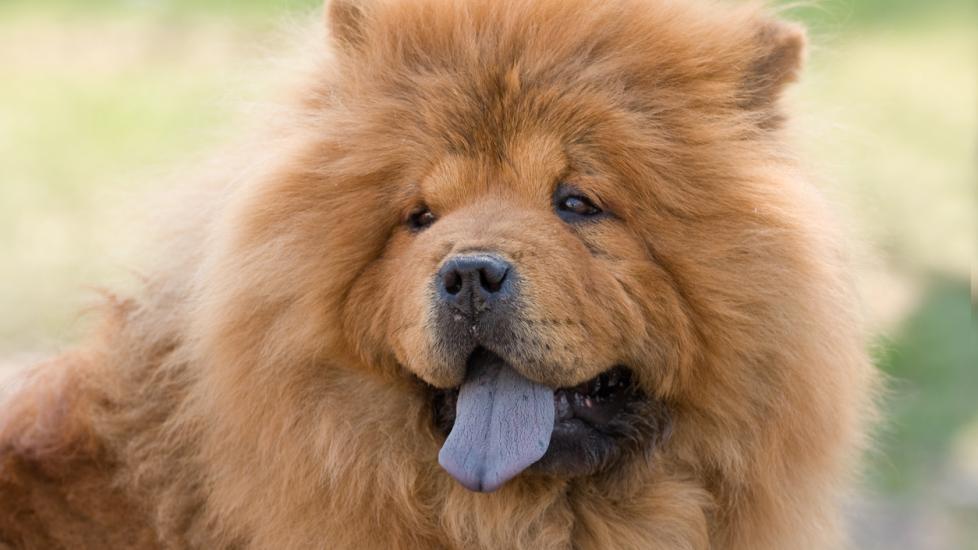Chow Chow
iStock/Iurii
The Chow Chow is one of the oldest dog breeds, according to the Chow Chow Club. Historians have pinpointed the Chow Chow’s origins to China’s Han Dynasty (206 BCE to 220 CE). They later gained popularity in Europe and, eventually, the U.S.
While the exact origins of the breed are unclear, Chow Chows (often simply called “Chows”) have performed many jobs over the years, including guarding, cart-pulling, hunting, and serving as companions.
A member of the non-sporting breed group, a Chow dog is easy to pick out from the pack thanks to their squished face, droopy eyes, fluffy coat, and characteristic blue Chow Chow tongue.
Caring for a Chow Chow
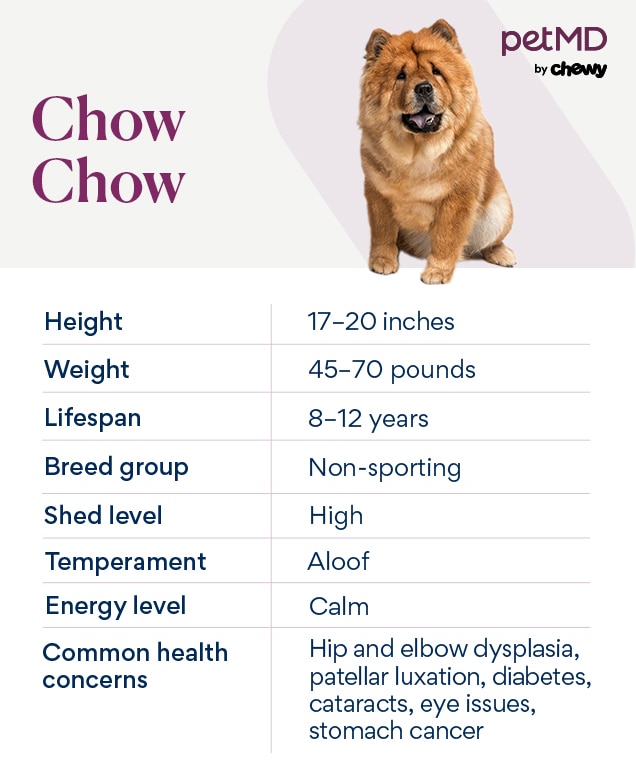
A Chow Chow, full-grown, stands 17–20 inches tall and weighs 45–70 pounds. With a flat face, fluffy fur, and curled tail, the Chow Chow’s appearance invites cuddles and affection. However, this regal breed would prefer if their space was respected.
A Chow Chow’s temperament might be aloof and wary of new people and other pets. But with early socialization, they can be more welcoming.
Chows are also intelligent and strong-willed, traits that don’t make them ideal dogs for first-time pet parents. But they are loyal to those they love, and their adaptability can make them wonderful companions.
Are Chow Chows Good With Kids?
With diligent socialization and training, Chow Chows can be good family dogs. Chow Chows tend to do better in families where children are older. They typically have one person at home who’s their favorite, but they will watch after the entire family.
Do Chow Chows Shed a Lot?
Chow Chows have thick double coats that shed moderately year-round and more heavily in the spring and fall. Frequent brushing is a must to reduce shedding and prevent matting.
Are Chow Chows Hypoallergenic?
Chow Chows are not considered hypoallergenic dogs due to their heavy shedding.
Chow Chow Temperament and Personality
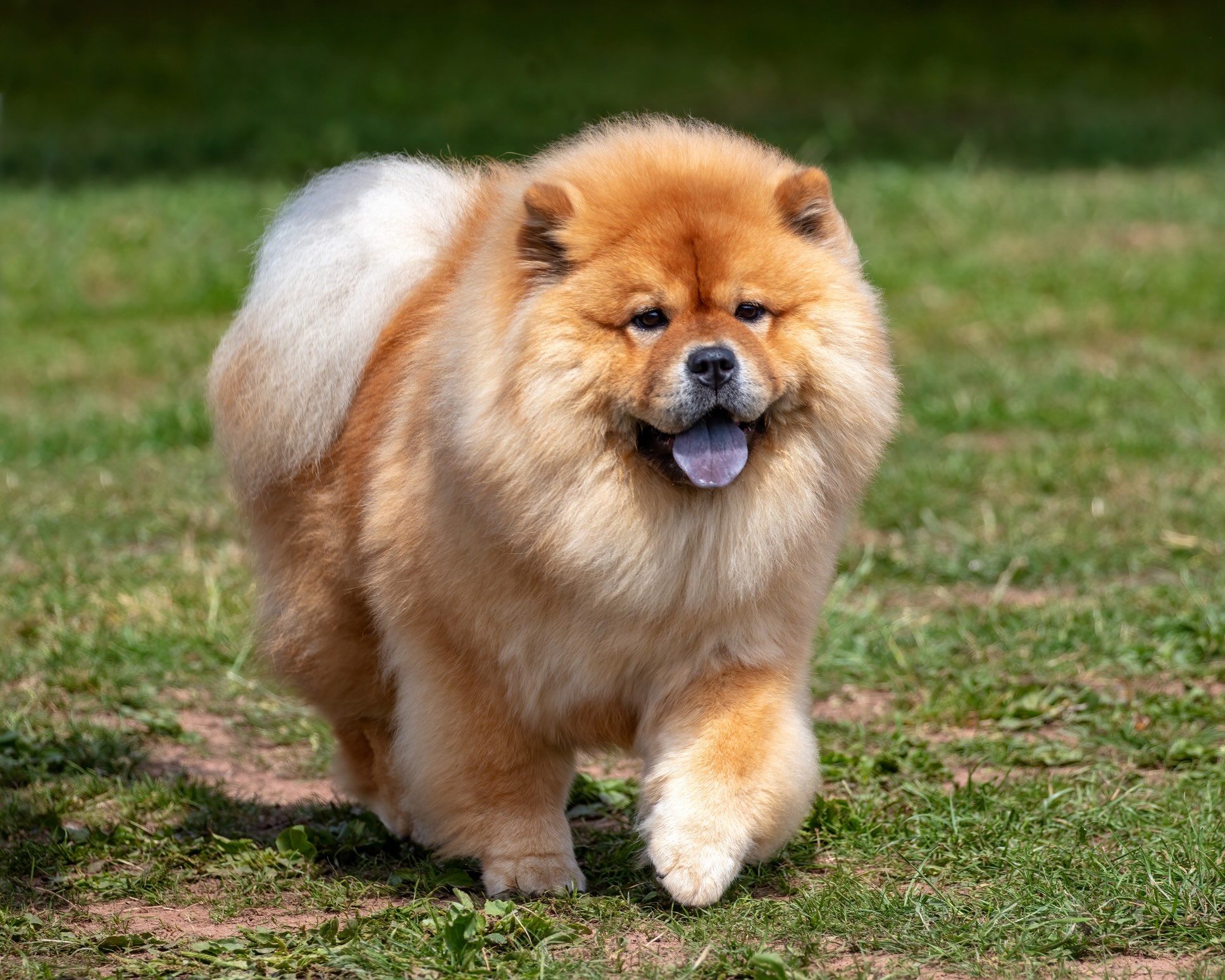
The independently minded Chow Chow is smart and loyal to their humans. When in a family unit, a Chow dog will typically have one person they are especially close with.
However, they are not known to be cuddly dogs and appreciate when their space and boundaries are respected. If they want attention, they’ll let you know.
Remember that a dog’s breed only influences about 9% of their behavior, and every Chow Chow is an individual.
How Much Exercise Does a Chow Chow Need?
Chow Chows are more likely to overheat because of their thick coats and short snout, so short spurts of exercise are better for them. A couple of 20-minute walks every day is enough.
In addition to physical activity, Chow Chows require mental stimulation to help keep them engaged in activities.
Are Chow Chows Friendly Dogs?
In general, Chow Chows are typically reserved around strangers. This makes it important for pet parents to properly socialize their Chow Chow puppy from an early age so your dog grows to be calm and confident around new people, new animals, and in new situations.
Do Chow Chows Get Along With Other Pets?
Every dog is an individual, but a Chow Chow might prefer being the only pet at home. They’re a reserved breed that likes their personal space. But if your Chow Chow puppy is raised with other animals, they can live well together.
Training and Behavior Tips for Chow Chows
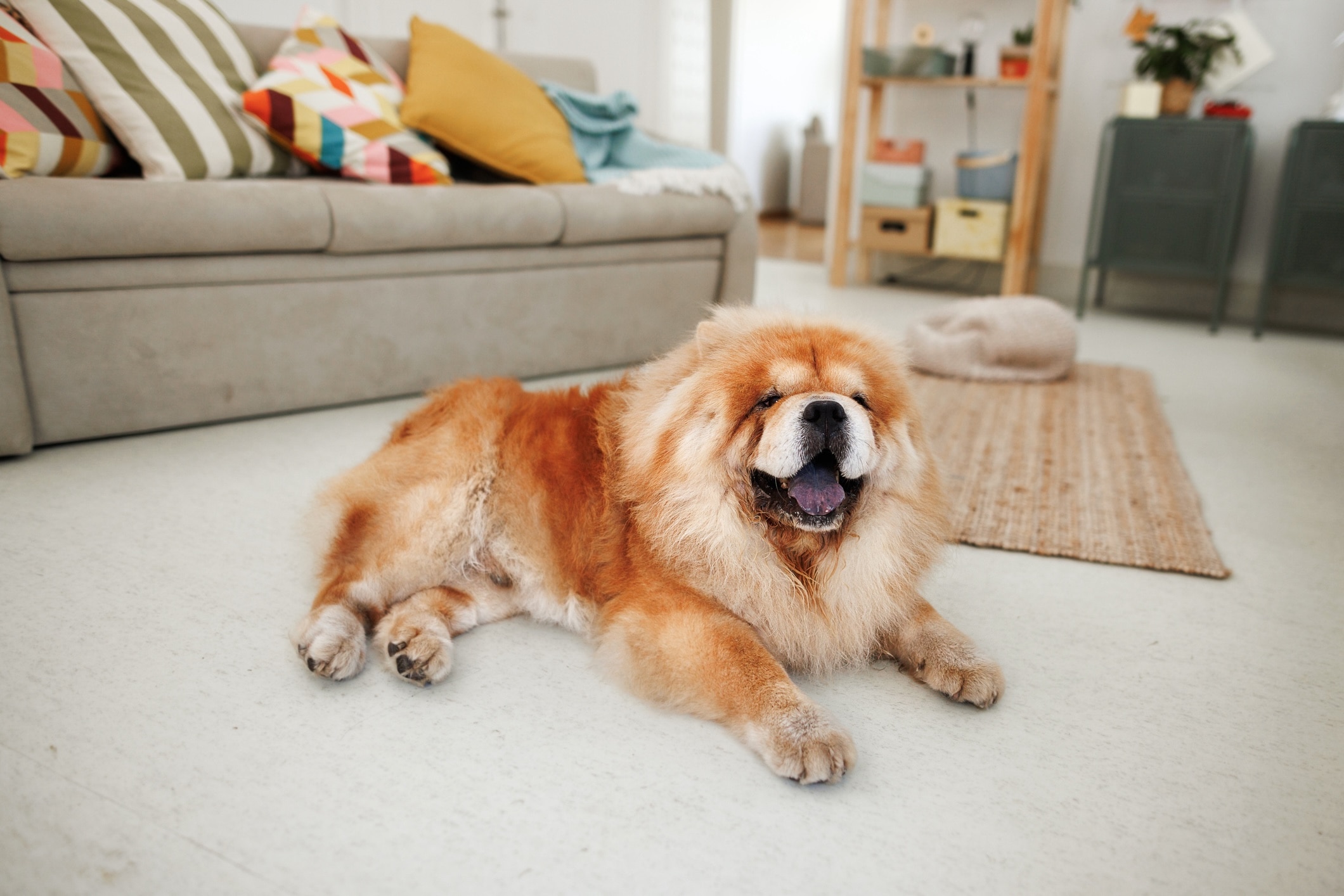
Chow Chows are smart dogs, which means they’re susceptible to boredom. To help make training successful, keep sessions short and creative. Training requires patience and consistent positive reinforcement.
Talk to your breeder about how they have approached socializing their Chow Chow puppies, as the best time to socialize a dog is when they’re 3–12 weeks old.
How To Train a Chow Chow Puppy
The breed club recommends specific tips for socializing your Chow puppy, including:
-
Picking up your puppy often and talking to him quietly
-
Encourage friends your Chow puppy hasn’t met to come over and pick them up
-
Expose your puppy to new sounds, including the TV and radio
-
Take your puppy with you on car rides
-
Introduce your Chow Chow puppy to as many new people as possible
When training, always use positive reinforcement like training treats, dog toys, and praise.
What Are Fun Activities for Chow Chows?
Chow Chow Health Issues
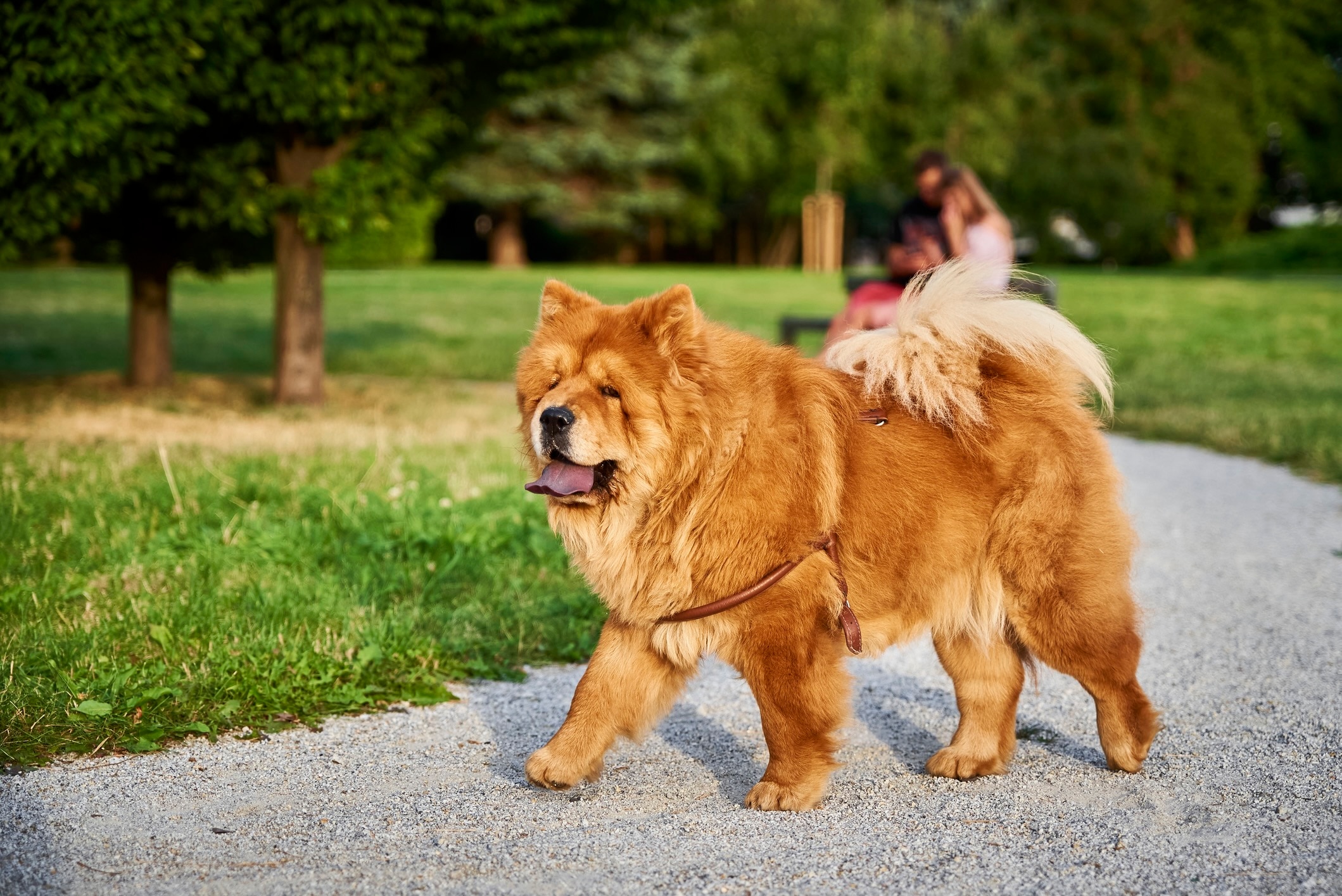
When considering adding a Chow Chow puppy to your family, it may be beneficial to consider pet insurance and budget for any medical issues that arise.
There are many diseases that are more likely to occur in the breed, and a Chow’s lifespan is shorter than some other dog breeds, at eight to 12 years.
Hip Dysplasia
Hip dysplasia is caused by the hip joint developing incorrectly, which can lead to gait abnormalities, pain, and arthritis. This condition is common in large dogs, including Chow Chows.
Depending on the severity, hip dysplasia can be managed with pain medication or with surgery.
Elbow Dysplasia
Similar to hip dysplasia, elbow dysplasia is typically seen in younger dogs when the elbow doesn’t develop properly. And, again like hip dysplasia, elbow dysplasia can cause arthritis as the dog ages.
Talk to your veterinarian if you notice your Chow dog limping on one or both forearms, walking with an abnormal gait, or if their elbow bulges to one side. Treating elbow dysplasia depends on its severity, but it can require surgery.
Patellar Luxation
Another joint condition, patellar luxation is when the knee joint slips out of its normal position. Telltale signs include a bunny-hopping gait or a limp that comes and goes.
As with elbow and hip dysplasia, the treatment for patellar luxation ranges from pain management to surgery depending on its severity.
Hypothyroidism
Hypothyroidism in dogs is a disorder in which the thyroid glands don’t produce enough thyroid hormone. This can lead to symptoms including:
-
Weight gain
-
Heat-seeking behavior
-
Dry, brittle coat
There is no cure for hypothyroidism, but dogs can live a long and happy life with lifelong medical care.
Diabetes
Diabetes is a condition in which a dog is unable to control their blood sugar levels, resulting in weight loss, lethargy, increased drinking and urination, and dehydration.
Older Chow Chow dogs and those that are obese have a higher chance of developing diabetes. Affected dogs will need lifelong insulin injections and diet changes.
Eye Problems
Chow Chows can develop a number of issues with their eyes, including:
-
Cataracts, when the dog’s eye lens become opaque (cloudy). Chow Chows can have a genetic predisposition for cataract development, but cataracts can also be secondary to diabetes.
-
Entropion is a common eye problem in dogs when the eyelid rolls inward. The eyelashes then rub against the eye’s surface, causing irritation and damage.
-
Distichiasis is a second eye disorder Chow Chows can develop, where one or more rows of eyelashes grow toward the eye, causing irritation.
-
Glaucoma is increased pressure in the eye that can be painful and lead to blindness. Like with cataracts, this can be inherited or caused by diabetes.
Stomach Cancer
Stomach cancer (or gastric carcinoma) is not a commonly reported disease process in dogs—it’s actually less than 1% of all cancer diagnoses. But Chow Chows are at an increased risk, and it’s suspected that this condition has genetic origins.
Some common clinical signs of stomach cancer include:
Gastric Dilatation-Volvulus (GDV)
Gastric dilatation-volvulus is a life-threatening form of bloat in dogs where the stomach fills with gas and rotates. This cuts off blood supply to vital organs, such as the spleen and stomach.
GDV requires immediate emergency veterinary care. Take your dog to the vet right away if you notice any symptoms, including if your Chow:
-
Is trying to vomit but not producing anything (retching)
-
Is pacing
-
Is unwilling to eat or drink
-
Has a distended stomach
-
Is drooling excessively
The chance of GDV can be reduced with a gastropexy procedure performed on your Chow puppy. Talk to your veterinarian about whether this is a recommended preventative surgery for your dog.
What To Feed a Chow Chow
The Chow Chow’s laid-back lifestyle makes them more susceptible to obesity and the additional health issues associated with it, such as diabetes, glaucoma, and arthritis.
Because of this, staying on top of your Chow’s nutrition is an important task for pet parents.
The Best Diet for Chow Chow Puppies and Dogs
These dogs need to eat a well-balanced dog food that is formulated for their life stage (puppy, adult, or senior) and meets Association of American Feed Control Officials (AAFCO) guidelines.
Ask your vet what the best dog food is for your Chow Chow. They will recommend a diet based on your dog’s weight, lifestyle, and health.
How To Feed a Chow Chow
GDV can occur after a dog eats, so caution should be taken during your Chow’s meals. To reduce the risk of the dangerous condition:
-
Feed your dog multiple meals per day, not one large meal. Adult Chow Chows should eat at least two meals per day, while Chow puppies can eat three or four meals every day.
-
Do not allow your dog to exercise directly before or after eating.
-
Do not feed your dog from an elevated food bowl. These are thought to increase the risk of bloat and GDV.
-
To slow your Chow Chow down during mealtimes, try feeding them with a slow-feeder bowl.
How Much Food Does a Chow Chow Need?
The amount you feed a Chow Chow depends on your specific dog’s health and lifestyle.
Following the feeding recommendations on the side of your dog food packaging will help reduce the likelihood of obesity in your Chow dog. Talk with your veterinarian as well, as they can give you more specific guidance tailored to your dog’s needs.
Nutritional Tips for Chow Chows
Healthy dogs eating an AAFCO-compliant diet will receive all necessary nutrients from their dog food. But because Chow Chows are predisposed to many coat and joint issues, it may be a good idea to talk to your vet about supplements for your dog.
Joint supplements with chondroitin and glucosamine can be beneficial to keep joints healthy, and omega fatty acids (such as fish oil) have anti-inflammatory properties.
Chow Chow Grooming Guide
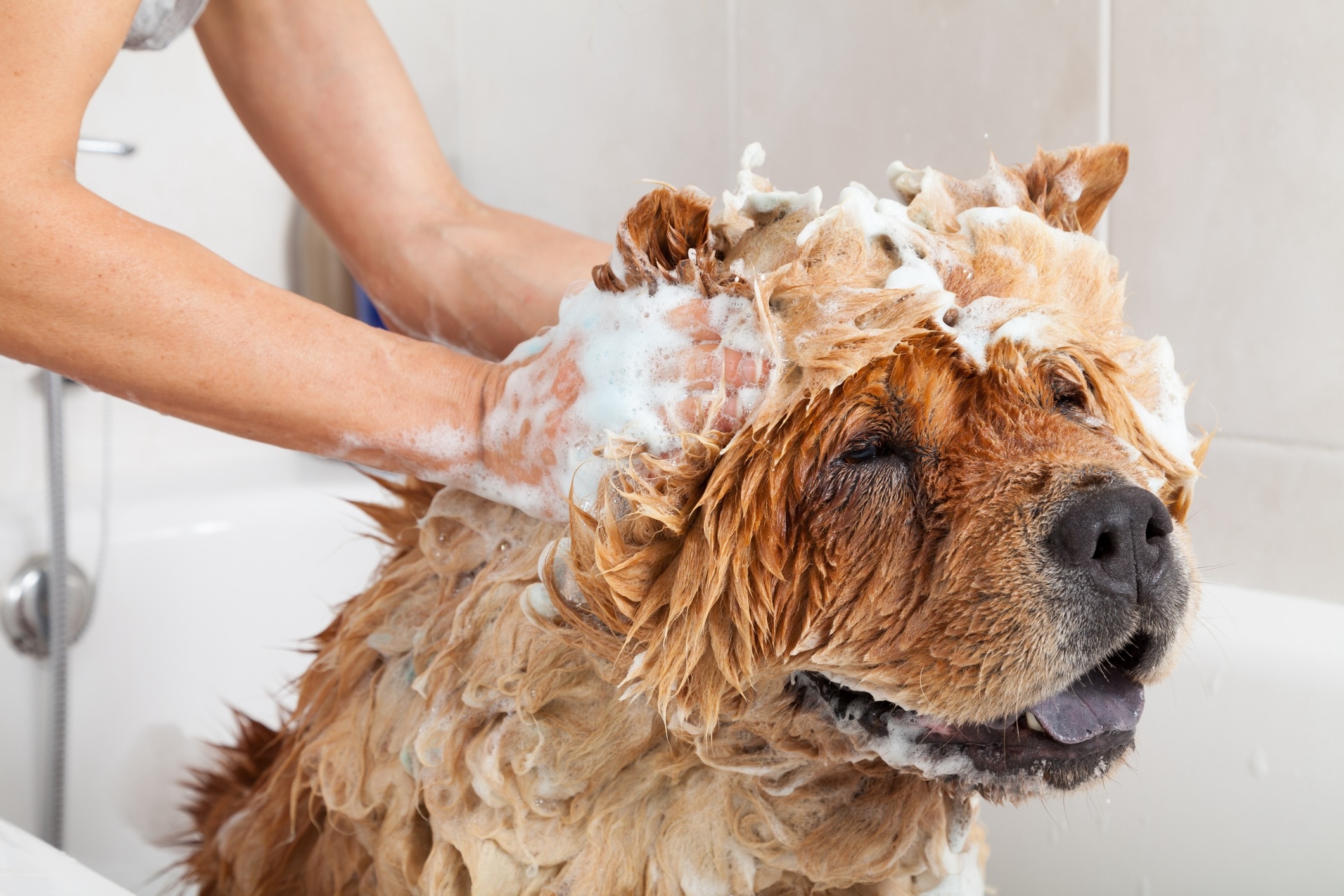
Pet parents must be prepared to spend a few hours every week grooming your Chow dog.
Skin Care
Regular bathing and grooming your Chow Chow may be needed to help maintain healthy skin. Never use a human shampoo on your Chow—instead, bathe them with a high-quality dog shampoo.
Coat Care
Chow Chows must be brushed every other day to prevent matting and control shedding. The breed club recommends using a Master Grooming Tools® Greyhound comb.
Eye Care
Chow Chows can develop a number of eye problems, so pet parents need to monitor their dog’s eyes for any changes. If your dog is squinting, has green or yellow eye discharge, experiences swelling, or if there are significant changes to the eye, take them to a veterinarian as soon as possible for treatment.
The long hair around your Chow dog’s face has the potential to get into the eye and cause irritation and infection. Regularly scheduled trips to a professional groomer can help remove some problem hairs from the face.
Ear Care
Chow Chow ears are erect. While any dog can develop ear infections, they are less likely than their floppy-eared counterparts.
After your dog gets wet (whether from a bath or a swim), it can be helpful to use an ear drum-friendly, self-drying ear cleaner to remove water from the ear canal.
Talk to your veterinarian about which ear cleaning products they recommend and the best technique for ear cleaning.
Considerations for Pet Parents
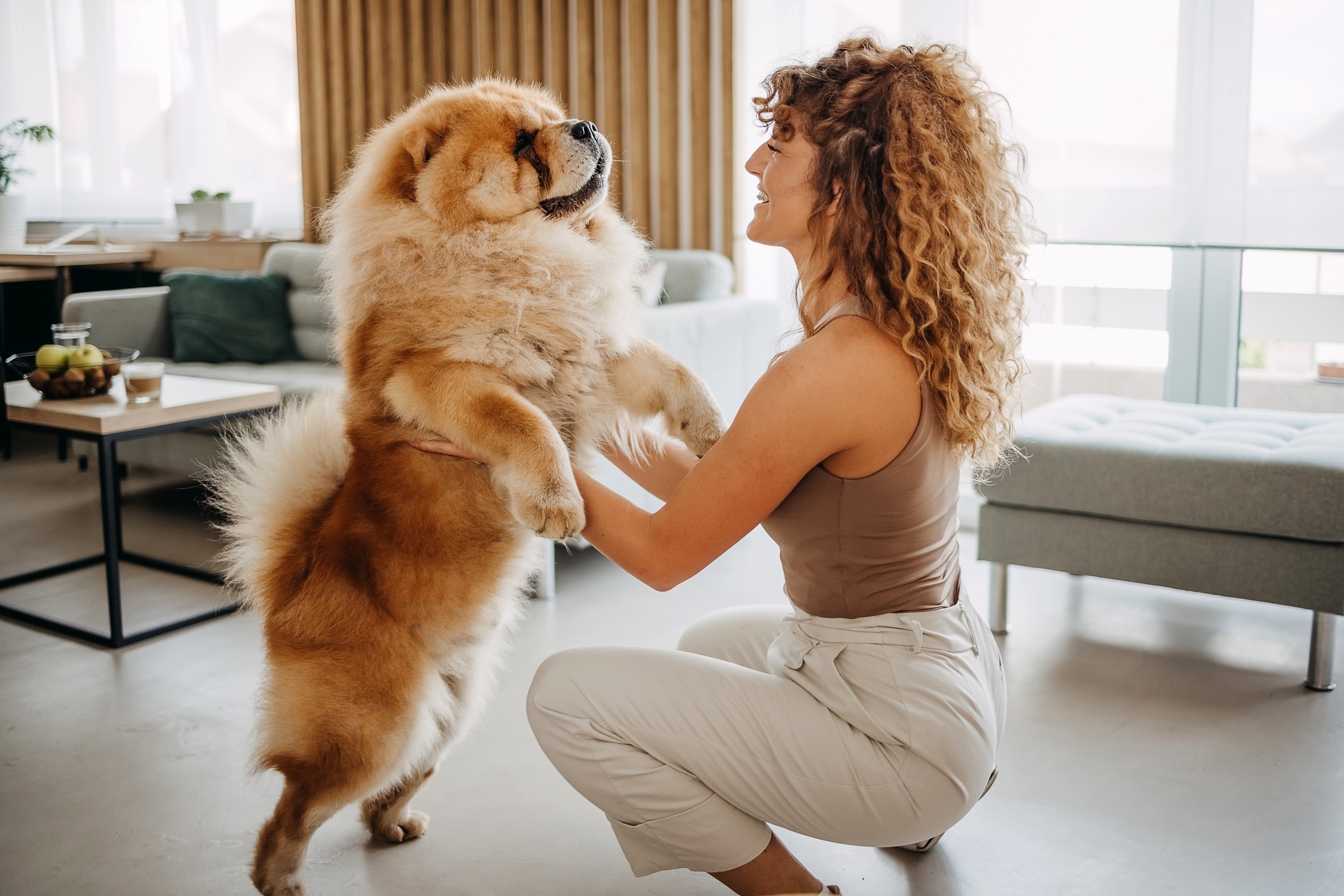
When looking for a Chow Chow puppy, it’s important to make sure the parent dogs have been genetically tested for hip, thyroid, knee, and eye problems, and that the results of these tests are recorded with the Orthopedic Foundation for Animals (OFA) or PennHIP and Canine Eye Registry Foundation (CERF), respectively.
If you are adopting a Chow Chow from a rescue or shelter, it’s unlikely that these pets have been registered, but always ask for all available health information on your dog. It’s also important that your new pet is examined by a veterinarian within the first two weeks after coming home to make sure they’re healthy.
Along with caring for their health, pet parents must dedicate themselves to training, socializing, and grooming their Chow Chow. This can be a good family dog, but Chows also like their space and tend to be more independent. If you’re looking for a cuddly lap dog, look elsewhere.
Chow Chow FAQs
How much do Chow Chows cost?
The Chow Chow puppy price can be $1,800–$3,000, depending on many different factors. The breed club has a directory of Chow Chow breeders.
Are Chow Chows smart dogs?
Yes, Chow Chows are very intelligent. Their smarts mean they’re likely to get bored with training, so short (but fun!) training sessions can be helpful to keep them engaged.
Are Chow Chow dogs rare?
While you might not find a Chow Chow at the dog park, the breed is not considered rare.
Are Chow Chow dogs lazy?
Chow Chows may not require as much activity as active breeds like the Border Collie, but they are not lazy. They need a couple of 20-minute walks every day, but Chow Chows are not made for long, rigorous amounts of activity.
Do Chow Chows bark a Lot?
All dogs bark, and Chow Chows are no exception. Thanks to their history as working dogs, Chow Chows may bark to alert their pet parents. Training can help reduce nuisance barking.
